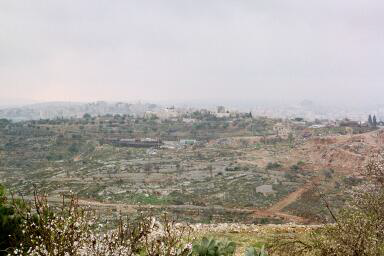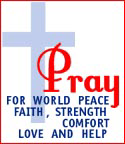
 Bethlehem, "house of bread", the town from which the famed King David came, has been in the news lately.
Bethlehem, "house of bread", the town from which the famed King David came, has been in the news lately.
Not far south of Jerusalem, it is one of the areas controlled by the Palestinian Authority. Because of the troubles since October last year, it wasn’t possible for non-Palestinians to visit it in February. The best the tour group could do was look at it in the distance across a deep valley further south.
Down in the bottom of the valley we could see a shepherd leading his small flock of sheep. Somehow I hadn’t expected the hills. I had imagined "out in the fields" in a "horizontal" sense.
 Bethlehem, regarded as "small among the clans of Judah" (Mic. 5.2), has been in the news again. Israeli tourism minister, Rehavam Ze'evi, was assassinated. Israeli forces have been into Bethlehem and other centres in quest of the terrorists believed to be responsible.
Bethlehem, regarded as "small among the clans of Judah" (Mic. 5.2), has been in the news again. Israeli tourism minister, Rehavam Ze'evi, was assassinated. Israeli forces have been into Bethlehem and other centres in quest of the terrorists believed to be responsible.
Two thousand years ago, Bethlehem was under the occupation forces of the Romans. Locally, they had delegated authority to a puppet king – the disliked and unpredictable King Herod.
The Roman Emperor wasn’t convinced he was receiving enough taxes from the provinces, so he ordered a census throughout the Empire.
Everyone was to go "to his own town" (Lk. 2.3). The phrase is a little ambiguous. I have always suspected that for taxation purposes the intention would have been "the closest town." But Jews, of course, had always been counted in tribes and clans. Their mass movement all over the country to get back to ancestral home towns may well have been their private protest which could have rendered the census results less than useful.
Though Bethlehem wasn’t a large town, everyone with ancestral connections to King David turned up. So it was that Mary and Joseph, moving with due care and caution down the road from Nazareth to Bethlehem, arrived after the inn was full.
So Mary’s baby – Jesus – was born in a stable and laid in a cattle feeding-box – a manger. Hardly ideal for a young mother and a new-born baby. Its one benefit was remoteness from the crowds in the inn, but in terms of hygiene and everything else?
"Out in the fields nearby" were some shepherds – also descended from David’s family? "An angel of the Lord appeared to them, and the glory of the Lord shone around them, and they were terrified."
But the angel said, "Do not be afraid. I bring you good news of great joy that will be for all the people. Today in the town of David a Saviour has been born to you; he is Christ the Lord. This will be a sign to you: You will find a baby wrapped in cloths and lying in a manger."
Good news? Another baby born in Bethlehem? The sign – a baby lying in a manger? But that can only be because it’s so crowded in Bethlehem! The reason is that we are being counted by the Romans! Their purpose is to raise more taxes!
Good news, you say? A Saviour, Christ the Lord? But… in a manger?
Yes, good news! Born when we weren’t expecting him, laid where even Herod wouldn’t look for him! That’s God for you – good news, indeed!
Herod, of course, did find out – through the well-meaning inquiry of the wise men from the east. Herod – that mean, selfish, evil man has his modern counterparts. He was notorious for getting rid of everyone whom he thought to be a threat to his position, including his wife Mariamne. His orders to kill all the baby boys in the vicinity of Bethlehem was very much in character with all we learn about him.
Good news! Yet the holy family had to flee into Egypt as refugees for two years! All of that is God for you – bringing his good news into the world! Read about it again in Luke 2.1-20 and Matthew 2.1-18.
Good news? It doesn’t seem to relate well to our lifestyle – our material plenty, our spiritual poverty. We are so busy spending – giving, receiving, partying, eating… We like celebrating all right, but what’s it all got to do with Christmas? How does it relate to the baby who had to be laid in a manger because there was no better place for him?
 Good news? At least one store has headed its Christmas advertising with the caption, "Pray for world peace, faith, strength, comfort, love and help."
Good news? At least one store has headed its Christmas advertising with the caption, "Pray for world peace, faith, strength, comfort, love and help."
Yes, we need good news! We are finding that trouble is at the doorstep of our comfortable society too. We desperately need to discover some good news in the midst of anxious times.
And that is what Christmas is all about. At the very point where we feel our weakness and vulnerability God sent his Son to be our "Saviour Christ the Lord." Yes, we need to pray for world peace, faith, strength, comfort, love and help. Yet above all God offers us the gift of his own Son, Jesus Christ. That’s God for you!
© Peter J. Blackburn, Link, December 2001
